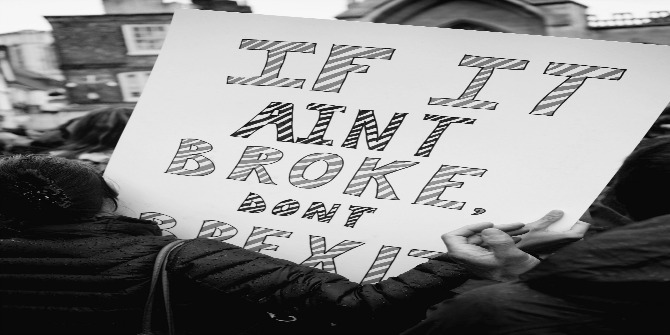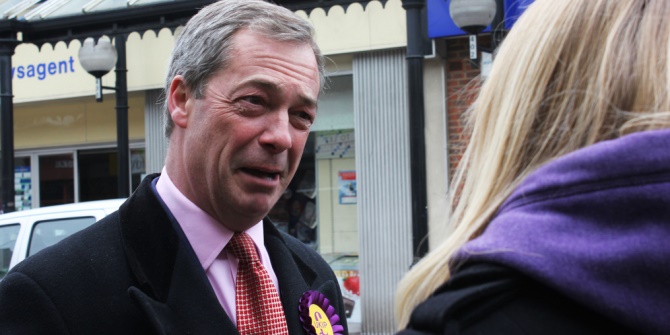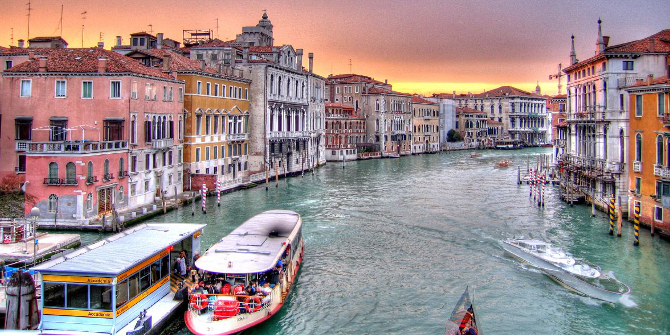 The shy pro-Europeanism of the last 40 years, together with the ways the EU was being abused for domestic purposes, all contributed to Brexit, writes John Gaffney. But the irony of it all is that the likely consequences of the vote could include both the break-up of the UK and that of the EU itself. An unnecessary referendum will therefore change the course of our history.
The shy pro-Europeanism of the last 40 years, together with the ways the EU was being abused for domestic purposes, all contributed to Brexit, writes John Gaffney. But the irony of it all is that the likely consequences of the vote could include both the break-up of the UK and that of the EU itself. An unnecessary referendum will therefore change the course of our history.
The four ironies of Brexit
We’re in the middle of a chain reaction. And the turmoil in both the Conservative and Labour Parties in the aftermath of the referendum is just the surface fallout of a deeper explosion within UK culture. What a sad irony that this unnecessary referendum will change the course of our history; and a sadder one that a national-centred gesture against the ‘Brussels Bureaucracy’ may well lead to the end of the United Kingdom – Scotland first.
The situation now in Ireland is as bizarre as it is unexpected. An at last invisible, normal border between the North and the Republic will potentially turn back to a ‘real’ border, reminiscent of the Troubles. Or perhaps no border. A united Ireland. Irony number three is that together with the prospect of having two land borders with the EU, Wales also voted ‘Leave’, and so Welsh nationalism is back on the cards. London too is not happy with its potential loss of European pre-eminence.
Sad irony number four: the Brexiteers will be thrilled that another of the unexpected consequences may be not just the break-up of the UK but that of the EU itself. By taking our ball home we may inadvertently bring the whole stadium down. However we define the terms, there are ‘populisms’ and Euroscepticisms on the continent, and UK populism will give them renewed vigour. In France, for example, Marine Le Pen’s Front National is jubilant at our referendum result and, as things stand, she is certain to go through to round two of next year’s presidential election. You would not think so, listening to the leaders in the member states or the Commission, but anti-EU feeling is spreading like wildfire across the EU.
Leaders’ personalities matter
So why all this? Well, two related things. First the role of certain individuals was central. Boris Johnson’s taking the leadership of ‘Leave’ was decisive. Without his ‘populist touch’, no one would have been able to capitalize on the situation – although his own performance would ultimately contribute to his divisiveness and his becoming a victim of his own strategy.
David Cameron conducted a serene, assured campaign, but severely ‘underperformed’ the messaging of what he had obtained in concessions from the EU; and of course he need not have called the referendum, and certainly not in the middle of the migrant crisis which was all mixed up in people’s minds as being related to our EU membership. Jeremy Corbyn’s ‘Remain’ role was lamentable in its half-heartedness; most Labour Party voters didn’t even know what his or the Party’s position was. And across the board, European leaders and others (‘the elites’, e.g. Barack Obama) fuelled the populist surge with their interventions.
Beyond all this, and this is my second point, the fault for all this mess lies not with the Leavers but with the Remainers. Tom Lehrer, the satirical songwriter, sang of the Spanish Civil War that Franco might have won all the battles but the Republic had all the good songs. The emotional rhetoric of the Leave campaign helped them win the battle; more precisely, the Remainers had no songs.
Shy pro-Europeanism
There are two aspects to this. First, in both the UK and elsewhere in Europe pro-Europeans have kept very quiet now for over 40 years, fearful of national feeling and afraid to develop a European discourse and rhetoric, and therefore identity. Second, and just as problematic, is the way that even pro-Europeans have abused the EU and used it to domestic purpose. Just like many UK politicians, in France, for example, pro-Europeans such as Jacques Chirac, Nicolas Sarkozy, and François Hollande have all at various times undermined the European idea to gain domestic advantage, particularly in electoral campaigns – even to the point of getting very close to the Leavers’ pull-up-the-drawbridge style or blaming, in turn, the profligate Mediterraneans, the inflexible Germans, or the neo-liberal ‘Anglo-Saxons’.
The EU is in desperate need of reform. Schengen doesn’t work, the Eurozone doesn’t work, the situation for the Greeks is dire, Brussels’ public relations and communication are rubbish, many communities have been left behind by the EU, the immediate and longer term humanitarian aspects of the migrant crisis need a coordinated European initiative, and so on. These are the issues that should have been addressed. If Remain had called itself Remain and Reform it would have swung it. I started with an allusion to a song. Here’s another: we are all finally facing our Waterloo.
____
 John Gaffney is Professor of Politics at Aston University and Co-Director of the Aston Centre for Europe.
John Gaffney is Professor of Politics at Aston University and Co-Director of the Aston Centre for Europe.









It’s not ‘irony’ but ‘bathos’.
“Brexit” Has shown us up for what we really are:Not the cuddly Elective Monarchy, but a Plantain-Phantasmagoria.
A Lilliput, whose dreams of striding the globe like a colossus are now realized as being best dreamed at home.
And as for the ‘debate’ – that penile-paradiddle. Both sides were singing from much the same hymn sheet: “The EU is terrible -but” verses “The EU is terrible-and”.
And so to the future:
The chances are that Brexit will fail, as just about the only thing sustaining it is the lack of a scapegoat.
Can the courts help? Will Parliament awaken to its core role?
Or will there be an election? An election that would give Remain renewed hope.
What we are all waiting for, of course, is for news of how our pre-negotiations are doing. And how best to avoid shame – and get around the truth (yet again).
What on earth would be so bad about an independent Scotland and a re-united Ireland? The UK, as currently constructed, is deeply undemocratic and riven with inequality. 9 of the top 10 poorest regions in the EU are in the UK. A shakeup of British politics that led to an end to the left-right see-saw, to proportional representation, and to spending on schools, hospitals and education instead of pointless nuclear weapons would be a good thing.
Remain and Reform would NOT have won. The British have proven reluctant Europeans and the public have been influenced by 40 years of anti-European propaganda. Cameron’s reforms were considered inadequate. The Leavers never had a plan and it will probably prove necessary for them (and, sadly everyone else) to experience the consequences of their lies before the English discover what they voted for.
“The ideas of the rulers are the ruling ideas,” says Marx, but the Brexit vote was one of the rare occasions when the usual order was overthrown, at least briefly. Hence the visceral shock we experienced. Jeremy Corbyn winning the Labour party leadership was another, thrown up from the same undertow of changing economic status and expectations.
Now reversion to the mean has already started. Theresa May epitomises the ruling ideas. She is the ideal person to ensure a) that a version of Brexit is implemented and b) that it will make as little difference as possible to the ruling order. The underlying democratic crisis has been starkly revealed but even if we are lucky it will take decades for it to be addressed.
Could another result (and irony) be that political realignment engulfs British politics?
The European Divide (Leave/Remain) has been a debilitating influence on British politics for many years. The issue is too toxic for both sides of the divide to be contained within one party and, in a sense, the referendum has decided nothing. For the sake of our democracy the political parties have to sort this out, even if it means party schisms and re-alignment. This divide is a bigger and more relevant and important divide than the traditional left/right or class based split.